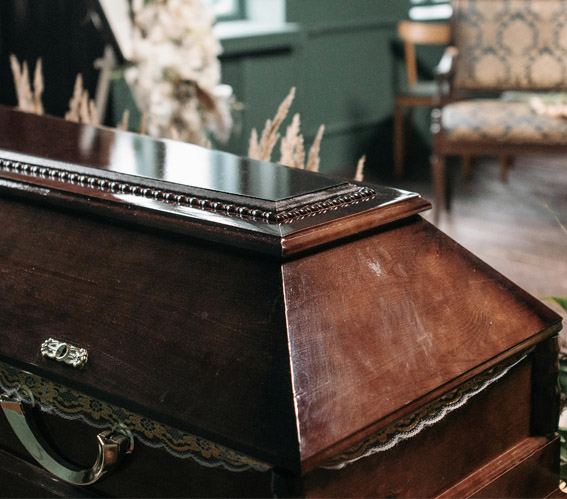What is Funeral Pre-Planning, and Why Do You Need It?
Are you someone who buys toilet paper as soon as you open the last pack in the house? Do you keep a meticulous calendar or pick out your outfits the night before you wear them? Or maybe you are more of a fly-by-the-seat-of-your-pants type. You see where your day takes you. You deal with concerns as they arise rather than trying to anticipate them. Are you the organized or spontaneous type?
Regardless of which of those sounds like you, you should consider pre-planning your funeral. It may be somewhat uncomfortable to think about, but taking care of your own final arrangements has many advantages. For habitual planners, it makes sense to treat this like you treat so many other things. For those who don’t think too far ahead, arrangements for the disposition of remains and other details are something you should prioritize. Funeral pre-planning can prevent stress, financial burden, and emotional overwhelm for the loved ones you leave behind. It also ensures you are memorialized according to your wishes.
What is Funeral Pre-Planning?
Funeral pre-planning is making arrangements for your end-of-life details while you are still able to. In other words, you plan at least some of the details of your funeral and body disposal so your heirs don’t have to.
Pre-planning your final arrangements can be anything from writing out some preferences on the back of an old receipt to specifying details of your wishes and including them in your legal will. While both versions count as “pre-planning,” one is likely going to lead to a better outcome than the other. (You can probably guess which one.)

You can have a family meeting to share your preferences or quietly make arrangements so things are in place. If you have that family meeting, will everyone remember the details? One person may swear you said you wanted to be buried in your wedding dress, while another is certain you said you wanted the wedding dress to be saved for the grandchildren. What happens then? There can be no misunderstandings if you have a document that lays everything out.
A few notes scribbled on the back of an envelope don’t help your loved ones cover the costs of your funeral. It may also end up lost, meaning it does nothing at all.
Pre-planning for your death involves deciding what you’d like to happen and figuring out how to convey that information to your heirs in an unmistakable way. It also means considering the finances of your preferences.
Now that we’ve answered the question of “what is funeral pre-planning,” let’s explore the concept in more detail when the time comes. However, the more official you make things, the more likely they will happen and the easier it is on your family.
Why Should You Pre-plan Your Funeral?
When you think of making arrangements for your eventual passing, writing a will may come to mind. You may also think of expressing your feelings to those you love or passing on family histories and heirlooms. These things are important, but handling the details of your funeral can be an even more compassionate, meaningful gesture. Here are some of the ways funeral pre-planning benefits your loved ones:
They Know How to Honor Your Wishes
When honoring a deceased loved one, every detail feels critical. If you don’t arrange for the perfect song at the start of your remembrance ceremony, your family may worry that they aren’t properly honoring you.
If you don’t select the exact outfit you’d want to be buried in, or specify between burial or cremation, your family may wonder if they are slighting your memory by choosing against your wishes. That’s a lot of pressure.

When you pre-plan, you can be as specific as you want. The significant details, like preferred body disposition method and location of your remains, are most important. But if it feels meaningful to you that your favorite flower is present at your funeral or they play your wedding song at a remembrance ceremony, you can also leave those instructions. While many of these details aren’t legally binding, your loved ones will appreciate the guidance. You relieve them of the pressure of guessing exactly what you would have wanted.
Imagine the stress of a family member who knows you would have preferred an intricate urn for your cremains (cremated remains), but the best they can afford is a simple container. They want to give you a place of honor and treat your remains as you’d have liked, but finances could get in the way. When your pre-planning includes prepaying, that won’t happen. That means your wishes and preferences are honored, and you are not burdening your family with costs they may not be able to afford.
Pre-planning Saves Money for your Family
Death arrangements can range anywhere from a few hundred dollars to tens of thousands. Much like weddings, where you have everything from a quick trip to the courthouse to a days-long celebration with hundreds of people, funerals and final disposition come in many forms. Those varying forms come with varied price tags.
With so much money potentially involved, pre-planning is critical. Here are some of the ways that pre-planning your funeral and other final arrangements can save money for your loved ones:

Your Expense, Rather than Theirs
With funeral pre-planning, you can cover the costs of your final arrangements rather than leaving that to your heirs. In other words, it’s an expense you pay rather than one your loved ones take on. You decide on details and determine how much they will cost. You can prepay for many items, including your cremation and urn or casket and burial plot.
If you choose to, you can also create a Payable on Death (POD) account that will go to the person responsible for making your final arrangements. These funds cover costs you can’t prepay, which include things like a donation for a religious officiant or food for a celebration of life.
When pre-planning includes prepaying, you avoid passing on to your family the expenses associated with your death. They can remember your legacy and celebrate your life without worrying about finances.
Today’s Prices for the Future’s Services
When you prepay expenses like your cremation, you pay today’s prices, even if it is years or decades before your death. If you feel confident about how you want your death to be handled, making those decisions and paying for them now can save thousands of dollars compared to the prices years later.
One hundred years ago, gas was about $0.11 per gallon. Now, the average price is close to $4. Imagine how much you’d save if you had locked in that 11-cent gas price. The same principle applies to funeral pre-planning. You pay today’s price for a service you may not use for many years.


Avoiding Pressure to Spend
When it comes to honoring you, your life, and your legacy, money should be no object. However, we all live under some financial constraints. Very few families can opt for the most expensive, lavish option for every element of someone’s final arrangements. Even if they can afford it, is that really how you want them to use their resources when some of those choices may be things you don’t even like or care about?
Without clear direction from you, your loved ones will always be concerned about whether choosing a lovely but less-expensive option for some arrangements means dishonoring you.
Families tend to feel pressure to overspend on final arrangements. Without clear direction, they will likely spend more than necessary to create the observance and final disposition you’d have wanted. It can feel like the choice between the hand-carved walnut casket and the more modest pine coffin is a test of how much they loved the deceased.
Your loved ones’ desire to properly honor you can become a massive financial burden you’d never have wanted. When you tell them, through your pre-planning, that the simple casket is fine but that an excellent burial location is important to you, you relieve them of the pressure to overspend in ways that don’t really matter to you.
When you pre-plan and pay for final expenses, you free your family from the intense pressure that makes spending money feel like a test of their love for you.
You Help Prevent Arguments and Conflict
What happens when one of your children thinks you’d like to be buried in the town where you grew up and where your parents are buried, and another feels certain you’d want to be laid to rest in the place where you spent most of your adult life? Or one heir believes you’d have preferred cremation, and another favors burial?

These are difficult issues at the best of times. When your family is grieving, they likely won’t be at their best. Emotions are high. Tempers are short. That means a minor disagreement over what to do with a loved one’s ashes or whether the deceased would have preferred an open or closed casket can snowball. A small dispute like that can turn into a broken relationship.
Sometimes, it’s finances that cause the conflicts. One decision-maker wants to splurge on an intricate urn. Another feels the deceased was modest and practical, meaning anything fancy or expensive is not only a waste but not what they’d have wanted. Or perhaps everyone agrees on the ideal situation, but one of the parties splitting the costs doesn’t have the funds.

You Have Time to Prepare Financially
When you pre-plan your final arrangements, you know the cost well in advance. If you decide to prepay for your funeral, you can wait until you have sufficient funds saved, then make and pay for the arrangements.
Knowing how much your preferred services will cost is still valuable if you choose not to pay in advance. You can set that money aside in a Payable on Death account so that it is immediately available for those needing to pay a funeral director, cremation provider, or other vendor. You can earmark money for final arrangements. You can also use your plans to determine costs and then purchase funeral insurance in an appropriate amount.
How Do You Pre-Plan Your Funeral?
The best way to pre-plan your funeral and ensure you don’t miss any important details is to work with a service that will walk you through the process. They have an understanding of the entire process and the many options available. These services ensure you consider all implications and address all details. To get you started on pre-planning, here are the basic considerations in a pre-planned funeral arrangement:
Decide on Handling Your Remains
Consider your preferences for your remains. Do you want a traditional burial or cremation? Would you like some or all of your body to be donated to science or other causes? There are many options, including having your remains made into a coral reef or memorial jewelry. Decide what feels most fitting.
When choosing burial, you should also decide where you want to be buried. Purchase a burial plot in your preferred location. With cremation, consider how you want your ashes to be handled. You can choose a location to have them spread, select and pay for an urn, purchase a spot in a columbarium, or otherwise direct the use of your ashes.

Choose Service Details
There are four main types of service.
- Funeral
A funeral is a traditional service. The body or remains are present in an open or closed casket or an urn. - Memorial
A memorial service honors the deceased without the remains present. It takes place after the remains are cremated or buried. - Graveside Service
A graveside service is held at the final resting place. It is often held in conjunction with a funeral. - Celebration of Life
A celebration of life honors and remembers the deceased’s life, focusing on joyful memories, valued accomplishments, and cherished relationships.
You can have any or several of these to honor your legacy, combining or adapting them as you see fit. Decide which options feel most appropriate and include them in your pre-planning.

Select a Venue or Funeral Home
Select a funeral home or cremation provider to handle your remains. You can read reviews online and visit potential venues to help you find the best options.
You may also want to select a venue for your service. That could be the funeral home, a place of worship, a park, a family home, a favorite public beach, or any location that seems fitting.
Add Personal Touches
You want your funeral to reflect you and the life you lived. Choose an officiant, music, pallbearers, speakers, or readings that are meaningful to you.
This is your opportunity to get creative. If you love barbershop quartets, request one perform at your memorial service. If you have a favorite poem, that can be part of the funeral. You can pre-select your epitaph (the inscription on a headstone or marker).
Discuss these choices with your chosen funeral home or family so everyone is clear on the details. You can also include them in your will.
Look into Costs and Prepaying
Once you know the details, you can calculate the costs of the service you’ve designed. You can prepay for some items, including the disposition of final remains and a grave site or location for your cremains.
Consider establishing a POD account with funds to cover the arrangements for other items. Some people purchase funeral insurance to cover the amount of their final expenses.
Thinking about your funeral can feel uncomfortable or morbid. However, considering how you want to be honored in death and what you prefer for your final disposition is a beautiful way to care for your loved ones after your death.
Pre-planning your funeral is a compassionate, thoughtful gesture. It removes a tremendous burden from your family, keeping them from struggling to decide what you would have wanted, ruining relationships over disagreements about your arrangements, and overspending on unnecessary or unwanted luxuries in your honor. When you pay ahead of time for your plans, you can ensure that giving you the send-off you deserve doesn’t become a burden for those you left behind. It’s well worth spending a bit of your time now on pre-planning your funeral. It will give your family the gift of peace, certainty, and financial security.
Find a Funeral Home Near You
Planning ahead for your funeral is a simple process. You don't have to wait! Make plans now.
